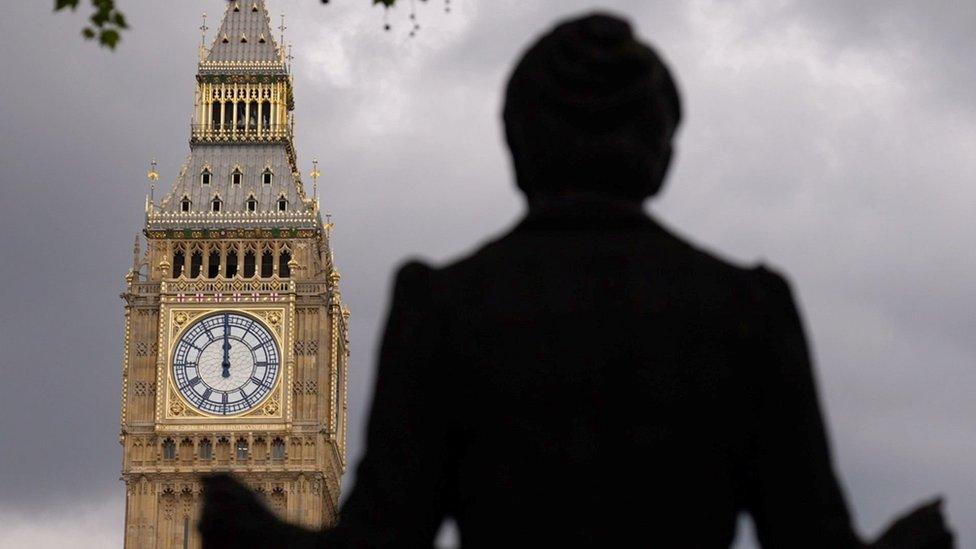Parliament researcher rejects China spying claims
- Published

A UK Parliament researcher arrested under anti-espionage laws amid claims he was spying for China has said he is "completely innocent".
In a statement released through lawyers, the man said he felt "forced to respond" to accusations in the media.
The researcher was one of two men arrested in March under the Official Secrets Act.
It is understood the researcher had access to several Conservative MPs.
China has rejected the allegations of spying, with foreign ministry spokesperson Mao Ning calling it "malicious slander".
House of Commons Speaker Sir Lindsay Hoyle has warned MPs against identifying the man - who is not being named by the Βι¶ΉΤΌΕΔ - using parliamentary privilege.
Lawyers for the researcher quoted him as saying: "It is wrong that I should be obliged to make any form of public comment on the misreporting that has taken place.
"However, given what has been reported, it is vital that it is known that I am completely innocent.
"I have spent my career to date trying to educate others about the challenge and threats presented by the Chinese Communist Party.
"To do what has been claimed against me in extravagant news reporting would be against everything I stand for."
The Metropolitan Police confirmed on Saturday that two men were arrested under the Official Secrets Act in March.
One of the men, in his 30s, was detained in Oxfordshire, while the other, in his 20s, was arrested in Edinburgh.
Sources have told the Βι¶ΉΤΌΕΔ one of them was a parliamentary researcher involved in international affairs issues.
Both men have been released on bail, and the Met's Counter Terrorism Command, which oversees espionage-related offences, is investigating.
China stance row
News of the arrests, first reported in the Sunday Times, came as Prime Minister Rishi Sunak was due to meet Chinese Premier Li Qiang on Sunday during a G20 summit in India.
A No 10 spokesperson said he used the meeting to convey "his significant concerns about Chinese interference the UK's parliamentary democracy".
The newspaper said the researcher had access to Security Minister Tom Tugendhat and Foreign Affairs Committee chairwoman Alicia Kearns, among others.
Mr Tugendhat is said to have had only limited contact with the man, and no dealings with him as a minister.
The arrest of the researcher has renewed a debate among Conservative MPs about whether the UK should take a stricter approach to China.
Senior Tory backbenchers, including former leader Sir Iain Duncan Smith and MP Tim Loughton, have called for the government to officially designate China as a threat to the UK - a move so far resisted by ministers.
'Clear eyed'
Some want China to be classed in the "enhanced tier" in the UK's security laws, updated earlier this year, bringing additional reporting requirements for China-linked organisations.
Speaking in the Commons, deputy PM Oliver Dowden said there was a "strong case to be made" for this, but the government was "currently reviewing" which countries to add.
Asked by Labour to confirm when the government first raised the arrest with China, deputy PM Oliver Dowden said that Mr Sunak "regularly" raises interference in democratic institutions with China.
He told MPs it would not be the case that "specific cases" under police investigation would be raised.
He added that ministers were "clear eyed" about the challenges posed by China, but added it was not realistic to "completely disengage" with the country.
The SNP's Kirsty Blackman said there should be a review into why all MPs weren't told until news of the arrests became public.
Defending the approach taken by the Commons authorities, Speaker Sir Lindsay Hoyle said it would have been "wrong" to brief all MPs, adding that those who "needed to be told were told".
China is the UK's fourth largest trading partner, and British ministers regularly highlight the need to work with the country on big international issues such as tackling climate change.
But relations have soured in recent years over a series of issues, including threats to civil liberties in the former British colony of Hong Kong and China's support for Russia during the war in Ukraine.